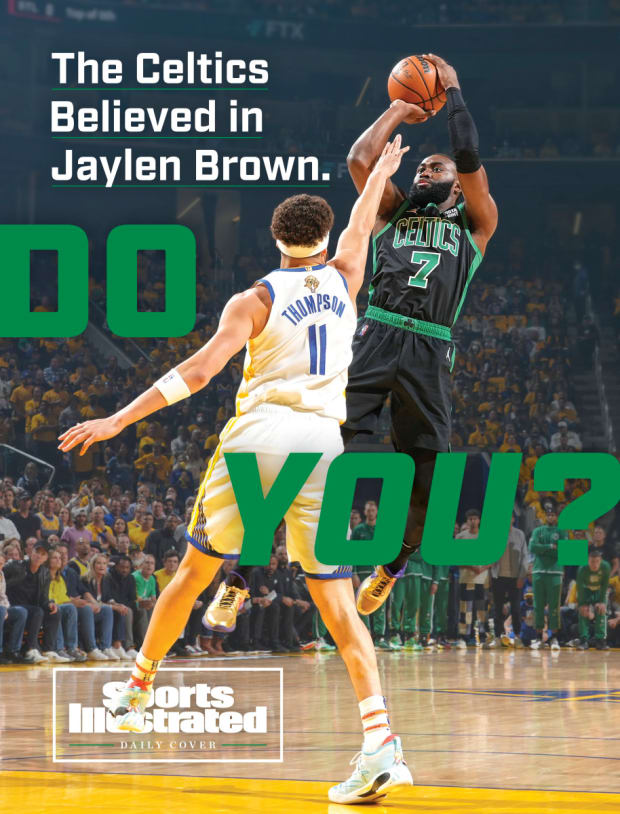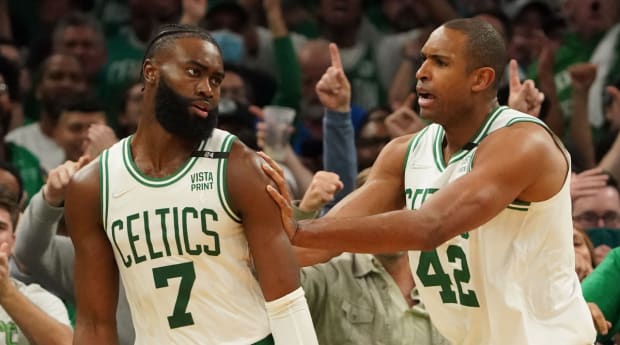The All-Star’s development has been critical, and the best could be yet to come—in the Finals and beyond.
Celtics majority owner Wyc Grousbeck wasn’t used to getting booed. But just over eight years after Boston won its 17th title, he stood inside TD Garden and delivered news to an impatient and hungry fanbase that didn’t approve of what he had to say.
“There has not been a trade,” Grousbeck said, standing before an acrylic lectern that had “2016 Draft Party” written on the front in green and white letters. “This guy is our guy. He’s our guy for the future.” Instead of fast-tracking their path back to title contention by dealing the No. 3 pick for an established star (some in the crowd tried to drown Grousbeck out by yelling Jimmy Butler’s name), the Celtics wagered on Jaylen Brown, a 19-year-old forward from Cal who wasn’t likely to contribute right away.
Brown remembers watching Grousbeck’s press conference in disbelief, as if it happened yesterday. “[Wyc] had to defend, like, ‘This is who we’re going with. You guys just gonna have to live with it.’ And I was like, ‘This is crazy.’ These guys have never seen me play before or, you know, I haven’t even got the opportunity,” Brown says during an off-day interview at the Finals. “It’s kind of trended like that my whole career. People in Boston that thought I was a bust, ever since have been kind of waiting to prove themselves right, in a sense, because that’s what humans do. But I’m not a bust. I keep getting better every year.”
Fast forward almost six years from that draft night and Brown’s journey has been ripe with postseason experience and accomplishment: The only year he missed the playoffs was 2021 (his only All-Star season), and it was because he tore a ligament in his left wrist. Since Brown was drafted, only 10 players have scored more playoff points (all are headed to the Basketball Hall of Fame). Only three have appeared in more games: P.J. Tucker, Jae Crowder and Danny Green. Throughout the 2022 playoffs, Brown has scored more points than anyone in the fourth quarter, with a higher effective field goal percentage than any player in at least 25 years who took over 60 shots.
Now, in the NBA Finals, he’s averaging 21.4 points, 7.4 rebounds and 3.8 assists, but with a 51.4 true shooting percentage that’s nearly 10 points lower than what he registered in each of the previous two rounds. At times he’s shone as an aggressive threat, splicing brilliant finishes at the rim with decisive action against a defense that induces confusion. In others, he’s looked rushed, pressed to create something out of nothing. In Game 5, he contributed to Boston’s ongoing turnover problem by coughing the ball up five times—one fewer than the entire Warriors team.

Jesse D. Garrabrant/NBAE/Getty Images
Overall, though, Brown’s development has been critical for this era of Celtics basketball. Deciding not to exchange him for Butler, Paul George or Kawhi Leonard (three forwards now in their 30s who’ve all changed teams more than once since Brown entered the league) was an intentional bet on upside and maximizing the organization’s potential number of championship runs (as opposed to amplifying a shorter window).
Trade speculation lingered into this season, when Brown’s seemingly incongruous fit beside Jayson Tatum was placed under a microscope. There were even whispers about shipping him to Philadelphia for Ben Simmons, which Celtics president of basketball operations Brad Stevens immediately dismissed.
“I think the organization has known the type of ability that I’ve had for a long time; even when casual fans thought they were crazy for not trading me for X, Y and Z, Danny Ainge and Brad Stevens knew,” Brown, now 25, says. “They seen me every single day, knew what I was capable of. Not to say I’m anywhere close to those guys yet, but I’m continuing to work and I’m excited that we’re here in the Finals now, going through this journey.”
If the Celtics are to climb back in these Finals down 3–2 and win the next two games, they’ll need Brown to be the best version of his most irrepressible self. Boston made the right call holding onto him. Now the only question is how big the reward will be.
Brown’s ascent was never guaranteed—he averaged 6.6 points per game as a rookie and then, two years later, lost his spot in the starting lineup—but those around him, from Ainge and Stevens, down to his own teammates, felt patience could be rewarded.
“Jaylen’s evolution is remarkable. Here with the team, we’ve seen it. We knew it was coming. It was just a matter of time when,” said Marcus Smart, the only player who’s been in Boston longer than Brown. “Early on in his career, he was just getting out and he was just running like a chicken with his head cut off. We would make a joke with him about that. Now he’s really thinking the game. He’s playing the game. He's letting it come to him and it’s slowing down for him. He gets us going, especially when Jayson is not being Jayson sometimes. It happens; teams are keying in on him. JB knows and understands that it’s his turn to take over when that happens. He's been great for us all year.”
Boston’s oldest player, Al Horford, was Brown’s teammate for the first three years of his career before they reunited this season. Today, he can’t help but notice how Brown has grown on the court and as a leader who finds ways to overcome the types of obstacles that frequently pop up for a tantalizing talent whose responsibilities fluctuate and accumulate from year to year.

Kyle Terada/USA Today Sports
“Jaylen came in the league and everybody knew the abilities, the potential that he had and all those things,” Horford said “The way that he takes care of himself, takes care of his body, the work that he’s putting in, all those things have paid off for him. When he got here as a rookie, I don’t know if I could have said any of those things. But the growth that I’ve seen with him over the years, it’s really impressive. … Just from him understanding how to play team ball, how to embrace challenges, he has been challenged a lot this year, and he responds.”
If Brown doesn’t become who he is today—an electric two-way wing who, at his best, can guard four positions, elevate above anyone in the league and erupt for scoring binges that flip whole games upside down—the Celtics are meandering around as a perennial seven-seed. Instead he’s become an ideal running mate for Tatum, whose own breakthrough as a primary playmaker has lessened the need for Brown to stretch his own game too far outside where he excels.
And Brown is still getting better, as Celtics coach Ime Udoka recently explained. When asked how his second All-Star has improved just in their one season together, from training camp through their Finals run, Udoka highlights Brown’s all-around willingness to adapt, be it communicating more on the defensive end or understanding how to better organize offensive sets.
In Game 3 of the Finals, Udoka saw what he was waiting all year to see. “I think it was almost a perfect night as far as the reads he made with his aggression looking to score, but also one, two dribbles and finding guys all over the court. That growth, as well as Jayson, was a big point of emphasis coming into the season.”
Still, for what he is and who he’s become, few stars have had their skill-set picked apart and taken for granted—i.e., being in trade rumors every year—quite like Brown has. For every positive acknowledgment of what makes him so potent, there’s an accompanying criticism about his plateau as a playmaker or, particularly over the past few weeks, his turnovers.

But whenever he’s asked about his own improvement, Brown likes to point out the impact opportunity has on the numbers; he insists that his own rise is contextual. Drafted onto a competitive team that’s cycled through several All-Stars (from Isaiah Thomas and Kyrie Irving to Gordon Hayward and Kemba Walker) who need the ball in their hands, it took time for Brown to assume the role that’s granted to most No. 3 picks.
Standing in a back hallway at TD Garden between Games 3 and 4 of the Finals, Brown chuckles when asked point blank what he can do in these Finals that he couldn’t five years ago.
“I can read the game a lot better than I did when I first got in,” he says. “But in terms of ability? Like, I could shoot. I could dribble then. I could do a lot of things then that I can do now, to be honest. You know, some people gonna think differently, because they see me turn it over and they seen whatever, but in reality I’ve been a pretty good basketball player my whole life. And the roles that I’ve been in, you know, kind of limit your ability. And a bunch of players have gone through that throughout the years so I’m not trying to make it about me, but you put me in a position where Jaylen can show what he does best, and you get the results.
“Every year,” he continues, “I come back and they say, ‘What did you do in the summertime? How did you make such an improvement?’ I did the same thing I did last summer [laughs]. There’s no miracles. Talent doesn’t fall from the sky. Of course I’ve gotten better. Of course I’ve worked on my game. But putting people in a position to be successful is key, too. And I’m almost glad that I wasn’t because it made me hungrier. It made me more humble. It made me even more grateful that when I got my opportunity that I wasn’t going to live it down.”
All those ups and downs, struggles and triumphs, have paid off for everyone in Boston, from Brown and Grousbeck to Stevens, Udoka and Tatum. When focusing on what he’s able to do, be it diving into his deep bag as an uncontainable flurry of independent shot creation, leveraging his athleticism on the defensive end or the slow but steady steps forward he’s made setting the table for others, the list of names Boston would rather have to fill the role Brown does, shortens every year. That draft night gamble back in 2016 has officially turned out to be a winning lottery ticket. And, even with their back against the wall against a team that’s loaded with proven champions, there are plenty of reasons to believe Brown’s best is yet to come, in this series and beyond.
“I think I’m one of the best players in the world. For whatever reason, I mean, people may not think so but that’s just my mindset,” Brown says.
“They said I shouldn’t deserve to be paid. They said I should be traded. It’s nothing new to me because it’s like, from the first day it’s been that type of energy. … I don’t really get sensitive about it. I don’t really think too much about it. I just come out and try to be the best version of me.”
More SI Daily Cover Stories:
• Steph Curry Is Dominating the NBA Like Never Before
• Inside the Celtics' Dramatic Turnaround
• The Warriors’ Daring Quest to Extend Dynasty Run